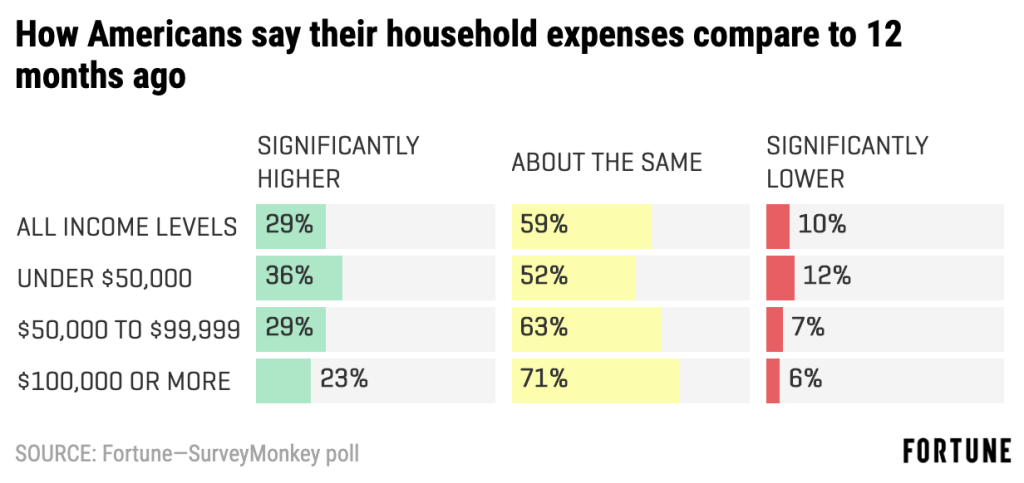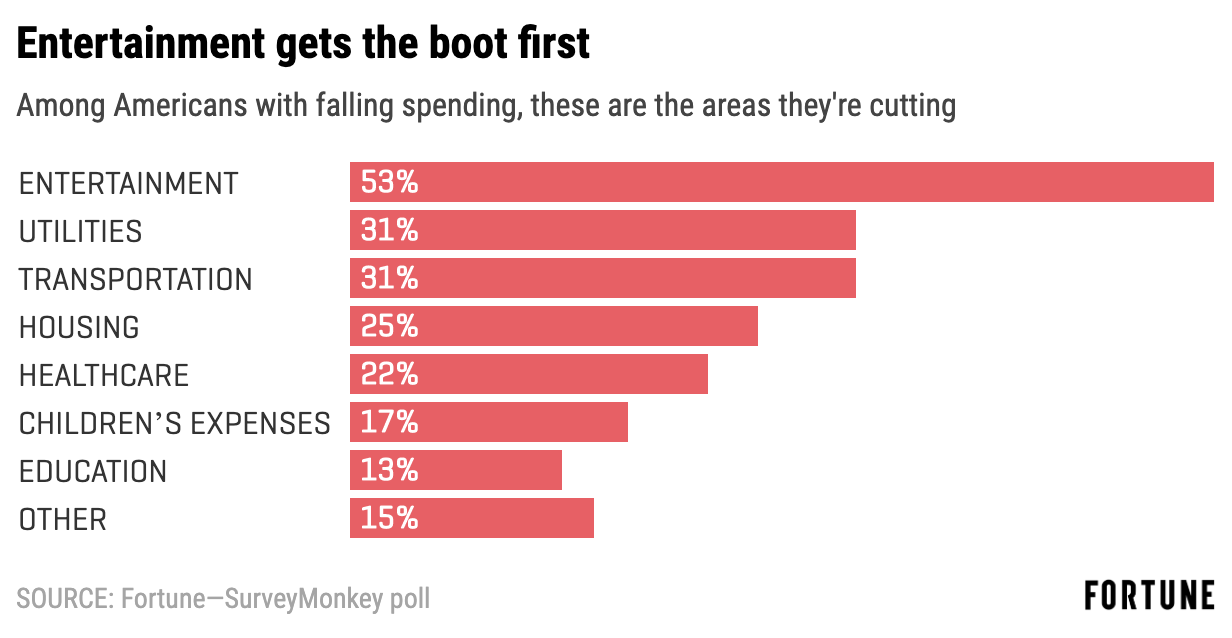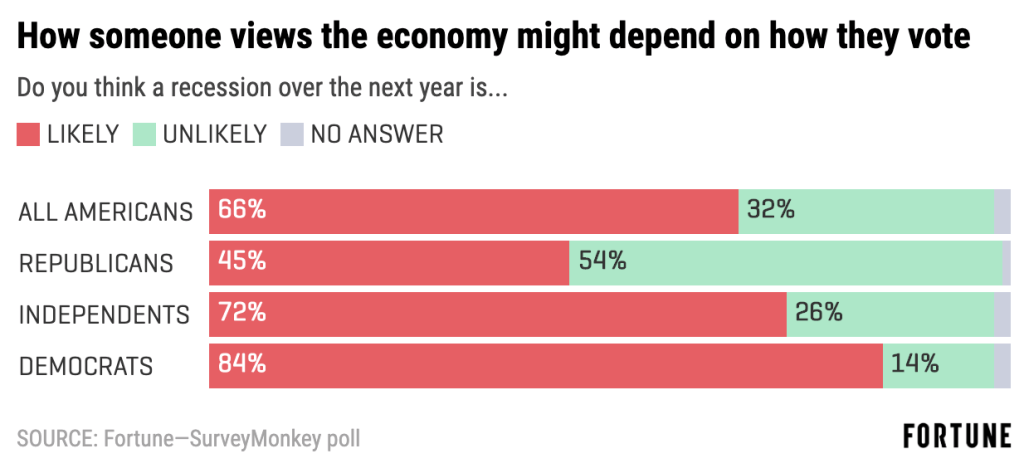《财富》调查:三分之二的美国人预计2020年美国经济将陷入衰退
Lance Lambert | 2019-11-28 21:30
分享:
 [译文]
[译文]
As long as American consumers—the lifeblood of the economy—keep spending away, recession speculation is unlikely to turn into reality. Maybe you shouldn’t feel guilty for that $5 coffee after all?
But this means we should keep a close eye on Americans spending habits and their personal economic outlook, especially when considering manufacturing is contracting. That’s why Fortune and SurveyMonkey teamed up to conduct a poll of more than 10,000 Americans.*
The big numbers you should know:
88%
· ... Americans say their spending levels are either up (29%) or flat (59%) compared to 12 months ago. While only 1 in 10 respondents have cut their spending budget year-over-year.
66%
· ... Americans think a recession will occur over the coming 12 months.
45%
· ... of Republicans think a recession will occur over the coming 12 months, compared to 84% of Democrats.
Big picture takeaway:
Americans are still throwing down money for the latest gadgets and buying big ticket items, however, their outlook of the economy is souring with the majority foreseeing a 2020 recession. And that growing pessimism is something economic onlookers need to watch.
“If not for consumer spending, we’d be in a recession... Consumer spending accounts for more than all of the growth in the economy. The rest of the economy is contracting,” says Scott Hoyt, head of consumer economic research at Moody’s Analytics.
In the third quarter, U.S. gross domestic product growth slowed to 1.9%, with key components like exports falling 5.7% and private investment down 1.5%. Yet consumer spending rose 2.9%, including a 5.5% jump in spending on goods, according to the U.S. Bureau of Economic Analysis.
Three deep takeaways:
1. Spending is up across the board
只要作为美国经济命脉的美国消费者继续慷慨解囊,有关经济衰退的预测便可能无法成为现实。毕竟,一杯5美元的咖啡可能算不上奢侈。
然而,这意味着我们应该密切关注美国人的花销习惯及其个人财务前景,尤其是在制造业不断萎缩的这个时代。这也是为什么《财富》杂志和SurveyMonkey携手开展此次调查的原因,其受调对象超过了1万名美国民众。
你应该了解的数字:
88%
· 88%的美国人称其开支水平较12个月前有所上升(29%)或持平(59%)。同时,仅有10%的受调对象出现了同比开支预算负增长。
66%
· 66%的美国人认为美国经济将在未来12个月内陷入衰退。
45%
· 45%的共和党人认为美国经济将在12个月内进入衰退,而民主党的比例为84%。
大环境分析:
美国人依然在毫不吝啬地购买新面世的产品和高价物品,然而,他们对经济的展望出现了大幅下滑,而且大多数人预测美国经济在2020年将陷入衰退。这个日渐浓厚的悲观主义则是经济观察家们需要关注的事情。
穆迪分析的消费者经济研究业务负责人斯考特·霍伊特称:“如果不是消费支出的话,美国经济早已进入了衰退……消费支出对经济增长的贡献比例过半,但其他经济领域都在萎缩。”
美国经济分析局称,第三季度,美国GDP增速降至1.9%,像出口这样的重点领域下滑了5.7%,私人投资下降了1.5%。然而,消费支出增长了2.9%,其中,商品购买开支出现了5.5%的大幅增长。
三大重要特征:
1. 消费开支全面增长

Among every demographic—whether it’s race, income, or region—households are more likely to be growing their spending levels than cutting back. And the importance of strong spending figures cannot be overstated: Over the past 50 years, consumer spending has risen from 59.5% of GDP to 68.1% in the latest quarter.
Some concerning responses did come from Americans who work in the agriculture industry, with 18% saying their household spending is lower now than a year ago—that’s the highest figure among the 29 industries we looked at. Perhaps workers in the agriculture business are feeling the impacts of the U.S.-China trade war.
2. Necessities over luxuries
无论在哪一个人口类目——种族、收入或地区,家庭开支更多地呈现出了增长而不是降低的趋势。尽管这个数字十分强劲,但我们不能高估其重要性:消费支出占GDP的比重从50年前的59.5%增至今年第三季度的68.1%。
来自于农业人口的反馈的确揭示了一些令人担忧的顾虑,有18%的人表示其家庭开支较一年前有所减少,这个数字在我们调查的29个行业中居于首位。可能从事农业的工人正在遭受中美贸易争端所带来的冲击。
2. 对生活必需品的需求高于奢侈品

The minority of households (10%) who are actually cutting household spending, are targeting entertainment expenses first. That makes sense: if you have a budget gap you’d likely drop a streaming service or scale back weekend getaways before cutting necessities.
3. The partisan divide
实际上,在削减家庭开支的少数家庭(10%)会优先削减娱乐消费。这是很正常的:如果出现预算不足的现象,人们很有可能在削减必需品购买开支之前放弃购买流媒体服务或减少周末旅行。
3. 党派分歧

Americans’ economic outlooks are dividend along partisan lines. Around 8 in 10 Democrats/Democratic-leaning voters think a recession is coming in the next 12 months. Meanwhile, a slight majority of Republican/Republican-leaning voters think a recession is unlikely.
One might assume those outlooks would be flipped when considering spending rose in 33% of Democratic households versus 24% in GOP households. So are people viewing the economic outlook with a personal politics lens? The economy is front and center during presidential election years, so obviously a downturn would be bad for an incumbent president and helpful for a challenger.
One interesting number:
35%
· ... of Americans say they’ve made changes to their finances to prepare for a downturn.
*Methodology: The Fortune-SurveyMonkey poll was conducted among a national sample of 10,372 adults in the U.S. This survey’s modeled error estimate is plus or minus 3 percentage points. The findings have been weighted for age, race, sex, education, and geography.
对美国的经济展望出现了以党派为界限的分歧。约80%的民主党/民主党倾向选民认为经济衰退将在未来12个月中到来。与此同时,略超过半数的共和党/共和党倾向选民则认为不大可能出现经济衰退。
然而,以下一组数字可能会让这些展望出现反转:民主党家庭和共和党家庭的开支分别增加了33%和24%。人们是否是在按照自己的政治倾向来推测经济走势呢?经济问题必然是总统选举年的中心议题,因此很明显,经济下行对于现任总统来说是个坏消息,而对于挑战者来说则十分有利。
一个有意思的数字:
35%
· 35%的美国人称他们已经调整了其财务开支,以迎接经济下行的到来。(财富中文网)
*调查方法:《财富》与SurveyMonkey的调查涉及全美10,372个成年人样本。该调查的建模误差估值为±3%。这些发现已经根据年龄、种族、性别、教育和地域进行了加权处理。
译者:冯丰
审校:夏林
相关阅读:



